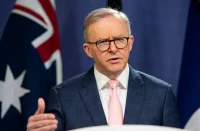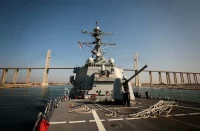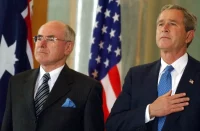Saudi Arabia threateningly accused Qatar of “declaring war” on the Kingdom for supposedly calling for the Holy Mosques in Mecca and Medina to be placed under international control.
Qatar denies that it ever issued such a statement, but that didn’t prevent the Saudis from reacting in a very harsh way by framing the idea as a declaration of war. This latest episode is emblematic of the still-simmering tensions between the two sides since they experienced their public falling out earlier this summer, but it also deserves to be analyzed in another respect concerning Saudi Arabia’s reaction to Qatar’s supposed statement. Never mind the fact that Qatar never publicly said anything of the sort, it remains a matter of public record that Iranian officials have regularly called for placing the Holy Mosques in Mecca and Medina under international control, which Saudi Arabia is absolutely against for several reasons.
The first is that the Kingdom derives its international – and one could even argue, domestic – legitimacy from being the caretaker of the two Holy Mosques, which therefore imbues the country with unparalleled soft power in the Muslim international community, or Ummah. Digging deeper into Saudi Arabia’s political history, it can be discovered that the country itself is held together by an alliance between the Saud family and the Wahhabi clerics, one which was first consecrated several hundred years ago but continues to this day due to the victory that both forces achieved in uniting most of the peninsula after the end of World War I.
About that, the modern-day political entity which calls itself Saudi Arabia – or in other words, the part of Arabia under the control of the Saud family – is actually formed from the militant unification of two disparate regions, the mountains Hejaz of the western coast and the desert Najd which occupies the rest. Hejaz was forcibly incorporated into Najd by the Saudi-Wahhabi alliance following the collapse of the Ottoman Empire, which had previously administered the two Holy Mosques in the name of the Caliph. Now that it’s under the Saudis’ control, it can be argued that the country’s King has always in some respects attempted to tacitly present himself as a successor of sorts to the Ottoman ruler in the strictly symbolic sense owing to his custodianship over the Holy Mosques.
With all of this in mind, it cuts to the core of the Saudi family’s ruling and international legitimacy to question their control over these two sites, which is why they view such statements as existential threats to their polity and therefore equivalent to a “declaration of war”. It’s also among one of the many reasons, aside from pure principle, why Iran repeatedly calls for international control over these territories, whether to ensure that pilgrims are protected and the Hajj isn’t ever politicized, or to contradict the Saudis’ implicit claims to be the leader of the Ummah by virtue of their responsibilities to these sites.
The post presented is the partial transcript of the CONTEXT COUNTDOWN radio program on Sputnik News, aired on Friday Aug 4, 2017:
DISCLAIMER: The author writes for this publication in a private capacity which is unrepresentative of anyone or any organization except for his own personal views. Nothing written by the author should ever be conflated with the editorial views or official positions of any other media outlet or institution.















In Islamic theology, only Allah and His final message Qur’an are HOLY. Ka’aba (Mecca), the Prophet’s Mosque (Medinah), and Al-Aqsa Mosque (Jerusalem) are sacred places due to their great significance in Holy Qur’an and early Islamic history.
The Guardianship of the two-cities were not promised to the al-Saud family – but by the British colonial empire to make sure political Islam doesn’t challenge West’s Judeo-Christian world. However, after the discovery of the ‘Black Gold’ in the 1940s – Saudi Arabia became a ‘Cash Cow’ for Britain and is former American colony.
Saudi Arabia’s problem with Qatar has nothing to do with the two mosques. It’s all about Qatar’s ‘oil alliance’ with Iran and its support for Gaza-ruling Hamas which are considered ‘existential threat’ by both Riyadh and Tel Aviv.
https://rehmat1.com/2017/06/06/al-saud-and-its-clients-cut-ties-with-qatar-over-iran-and-hamas/